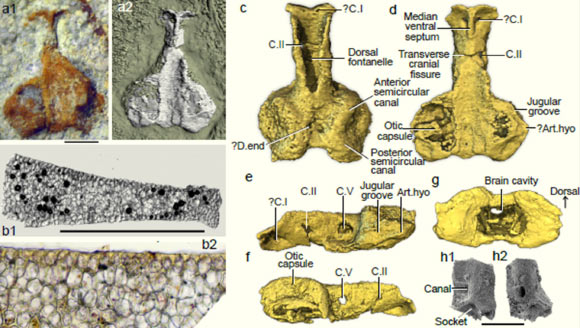Palaeospondylus gunni, a small creature with an eel-like body that lived during the Middle Devonian epoch around 390 million years ago, is represented by thousands of similarly preserved fossils from Achannaras quarry in Caithness, Scotland. With radically different interpretations of its structure, the species had been assigned to almost all major jawless and jawed vertebrate groups. Paleontologists have now described a new and older species of Palaeospondylus from the Early Devonian of Australia.
First described in 1890, Palaeospondylus is a mysterious fish-like animal with a strange set of morphological features, including a lack of teeth and dermal bones in the fossil record.
Until now it has been only known as Palaeospondylus gunni from the Middle Devonian Orcadian Basin of Scotland.
It was initially interpreted as a jawless vertebrate, and shortly after placed in its own order and family.
Whereas the Scottish specimens are extremely compressed, with all skeletal elements welded together, the new discovery of Palaeospondylus, in a 400-million-year-old limestone of Georgina Basin, western Queensland, central Australia, has a completely different preservation as 3D uncrushed elements.
“This is a remarkable addition to Queensland’s fossil record, at the other end of the size scale to prehistoric giants like dinosaurs Rhoetosaurus and Australotitan cooperensis,” said Queensland Museum paleontologist Carole Burrow and colleagues.
“What makes Palaeospondylus australis even more intriguing is its connection to a similar species from northern Scotland, Palaeospondylus gunni.”
The new fossils’ honeycomb-like structure and intricate internal features hint at the fish’s early evolutionary significance.
While the exact relationships of Palaeospondylus australis remain unclear, with features indicating it retained many larval characters, it is likely a distant relative of sharks.
This breakthrough not only enriches our understanding of ancient…
Read the full article here

